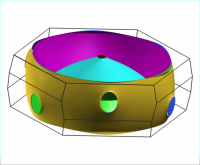EPSRC funding for electronic structure calculations.

Prof. Graeme Ackland at the School of Physics has received significant EPSRC funding for electronic structure calculations using density functional theory.
The award comes through the United Kingdom Car-Parrinello Consortium (UKCP) collaboration, which has been expanding for 25 years since it was established in 1991 to fund Physics and EPCC to write the first parallel computing density functional theory code. Ackland is the only ever-present co-investigator. UKCP is one of the most prolific collaborations in UK Science, publishing 106 papers in 2015 including Edinburgh-led studies on advanced titanium alloys and the physics of high pressure hydrogen.
Since UKCP began, Density Functional Theory has established itself as the standard method for solving the many-body quantum mechanics of electrons in solids and liquids. It provides a way to calculate a full range of material properties for substances, including properties which are impractical to measure and for materials which have yet to be synthesized.
The 4-year grant is worth over £5M, split 80% for supercomputing at UoE's ARCHER facility and 20% staff costs.
The project will provide resources for School researchers Graeme Ackland, Andreas Hermann, Ingo Loa, Miguel Martinez-Canales to continue their studies on high pressure materials, thermoelectrics, planetary interiors and fundamental understanding and interpretation of Raman, infrared, X-ray and neutron scattering experiments carried out within CSEC.

